Nazi Ideology

National Socialism
Adolf Hitler and his followers in the National Socialist German Workers’ Party (NSDAP) had a strong commitment to values and ideas. Under Hitler’s leadership the NSDAP developed its own ideology, which informed both its methods and objectives. They called this ideology National Socialism; today it is more commonly referred to as Nazism. Ideology seems central to the Nazi movement – however while Nazism revolved around some common ideas and prejudices, Nazi ideology was relatively fluid. The NSDAP had very few clear and concrete expressions of its ideology, only its 25 Points (drafted in 1920) and Hitler’s rambling memoir Mein Kampf (1924). In many respects, Nazi ideology was defined by Hitler himself. It was contained in his speeches, policy statements and orders. It could and did change over time, as Hitler’s objectives changed, and was not without its contradictions.
Racism
Their dark obsession with race separated Hitler and the Nazis from many other fascist and nationalist groups. The Nazis considered Aryans – those of Nordic heritage, with blonde hair and blue eyes – to be Europe’s ‘master race’. According to Nazi racial theory Aryans were physically stronger, more intellectually advanced and more culturally gifted than other European races. The Nazis saw races like the Jews, Slavs and Romany to be untermensch (‘inferior men’). The Nazis embraced the pseudo-science of eugenics, that claimed society could be improved by adopting policies of ‘genetic hygiene’, such as the compulsory sterilisation or euthanasia of the mentally ill or disabled


Charisma And Oratorical Skills + Skilfulness at making deals with politicians
Charisma
How did he manage to turn from a nobody in 1913 into the chancellor and fuehrer of the German People?
Hitler was the archetypal "charismatic leader". He was not a "normal" politician - someone who promises policies like lower taxes and better health care - but a quasi-religious leader who offered almost spiritual goals of redemption and salvation. He was driven forward by a sense of personal destiny he called "providence".
Before WWI he was a nobody, an oddball who could not form intimate relationships, was unable to debate intellectually and was filled with hatred and prejudice.
But when Hitler spoke in the Munich beer halls in the aftermath of Germany's defeat in WWI, suddenly his weaknesses were perceived as strengths.
His hatred chimed with the feelings of thousands of Germans who felt humiliated by the terms of the Versailles treaty and sought a scapegoat for the loss of the war. His inability to debate was taken as strength of character and his refusal to make small talk was considered the mark of a "great man" who lived apart from the crowd.
More than anything, it was the fact that Hitler found that he could make a connection with his audience that was the basis of all his future success. And many called this connection "charisma".

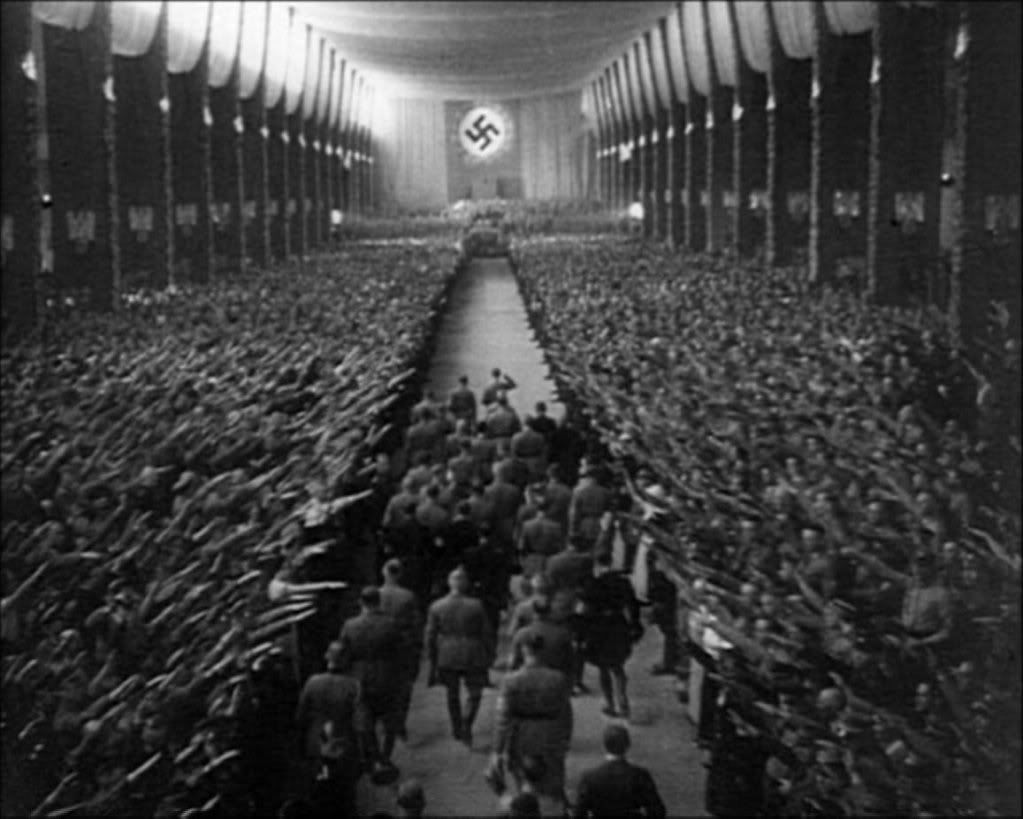
This picture shows that millions of people listens to Adolf
Hitler.
Oratorical
The speaker from the heart is different. He may have the skills of the master of reasoning. They are, however, only tools he uses as a true rhetorical virtuoso. He has abilities not found in the reasoning speaker. He combines clear diction with simple argumentation, and instinct tells him what to say and how to say it. Language is united with ideas. He knows the secret corners and aspects of the mass soul and knows how to reach and touch them. His speeches are masterpieces of declamation. His voice reaches out from the depths of his blood into the depths of the souls of his listeners. He brings to expression the secrets of the human soul. He rouses the tired and lazy, fires up the indifferent and the doubting, turns cowards into men and weaklings into heroes.
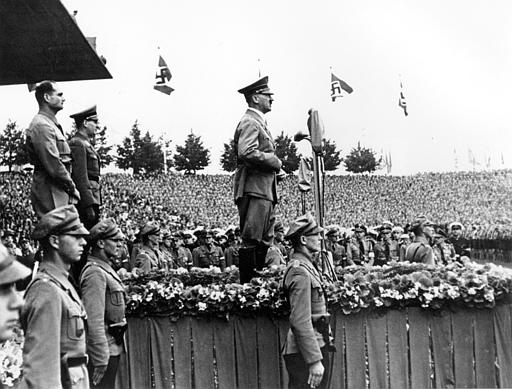
Hitler Skill At Public Speaking
Hitler was one of the most charismatic public speakers in history, which is how he was able to manipulate so many people to commit such atrocities during the Holocaust. One could say he was influenced by his passion for hating the Jews, or his corruption with power. Before he became an important person, he tried making public speeches in the 20's, and was very poor at it. He took voice lessons from a famous Jewish magician in Germany, and developed into an extremely influential speaker.
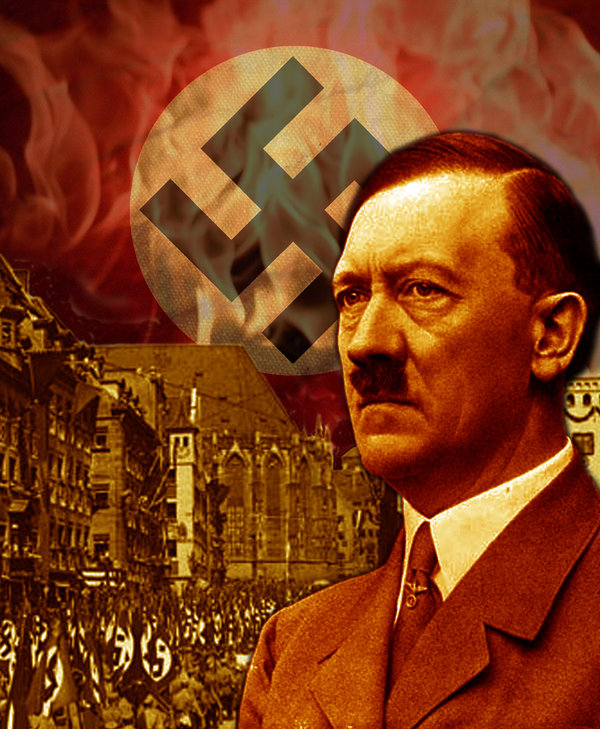
Exploitation of the fears of Communism + Reorganisation of the Nazi Party
Communism
The Communist Party of Germany won four times the votes of the Nazi Party. However, despite the support, the communist did not form the majority of Reichstag. In fact, many groups of people feared that the communist will later take over the country. Farmers feared the communists because the communists believed the state should ow all lands and assets. They had heard that in Soviet Union, government had taken farmers lands and killed and imprisonment millions in the process.
His and his party's power originally were from support from the worker class. Communists were their competitors. The only difference between them was the communists told the workers to hate the capitalists from an economic perspective. Nazi told them to hate foreigners, communists and Jews from a racial supremacy and living space perspective. They reason workers wanted to listen to them was simply because they were hungry and jobless.

Reorganisation of the Nazi Party
The Nazi Party started off with very little support. Hitler attempt to overthrow the Weimar Government by staging a coup in Munich. Then, Hitler was send to jail. After release, Nazi began to participate in elections.
After the disaster of the Munich Putsch, and during the prosperity of the Stresemann years, however, support for the Nazis fell. During this time Hitler believed that he could be elected to power. He used these years to develop and strengthen the party's organisation.
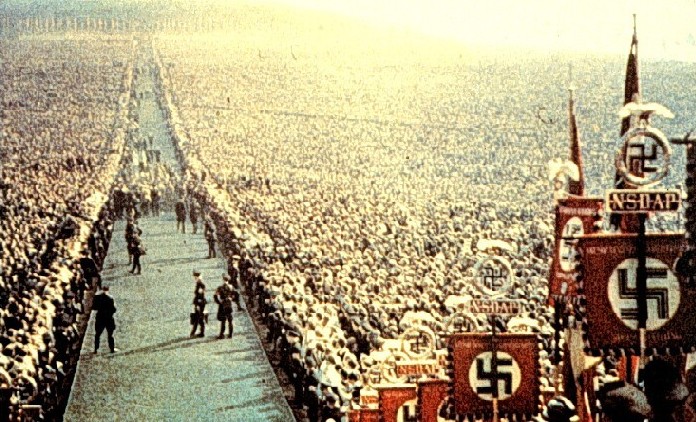
I can infer that a lot of people is trying to raise the Nazi Party by supporting Adolf Hitler Speech.
In 1929, Germany entered a period of severe economic depression and widespread unemployment. The Nazis capitalized on the situation by criticizing the ruling government and began to win elections. In the July 1932 elections, they captured 230 out of 608 seats in the “Reichstag,” or German parliament. In January 1933, Hitler was appointed German chancellor and his Nazi government soon came to control every aspect of German life.
Under Nazi rule, all other political parties were banned. In 1933, the Nazis opened their first concentration camp, in Dachau, Germany, to house political prisoners. Dachau evolved into a death camp where countless thousands of Jews died from malnutrition, disease and overwork or were executed. In addition to Jews, the camp’s prisoners included members of other groups Hitler considered unfit for the new Germany, including artists, intellectuals, Gypsies, the physically and mentally handicapped and homosexuals.
This shows that Hitler is working to increase the power for the Nazi Party.
When the war broke out on July 31, 1914, the Reichsbank (German Central Bank) suspended redeemability of its notes in gold. After that there was no legal limit as to how many notes it could print. The government did not want to upset people with heavy taxes. Instead it borrowed huge amounts of money which were to be paid by the enemy after Germany had won the war, Much of the borrowing was discounted and monetized by the Reichsbank. As explained later, this amounted to issuing straight printing press money.
By the end of the war, the amount of money in circulation had increased four-fold. In view of this, the extent of inflation was less than one might have expected. The consumer price index had risen 140% by December 1918. This was equal to the inflation during the same time in England, a little more than in the United States, but less than in France. Yet the floating debt of the Reichsbank had increased from 3 billion to 55 billion marks!
Why was inflation kept within bounds? For the same reason that it got off to a slow start in the Unites States during World War II. Necessities were rationed and luxury goods were not easily available. Millions of men were at the front and not in the market for goods. Civilians worked hard and had little leisure for spending. People saved money against peace time, and in some cases to evade taxes. But the fuel for inflation was accumulating in the form of vast hoards of money.

Images showing kids playing with the worthless banknotes
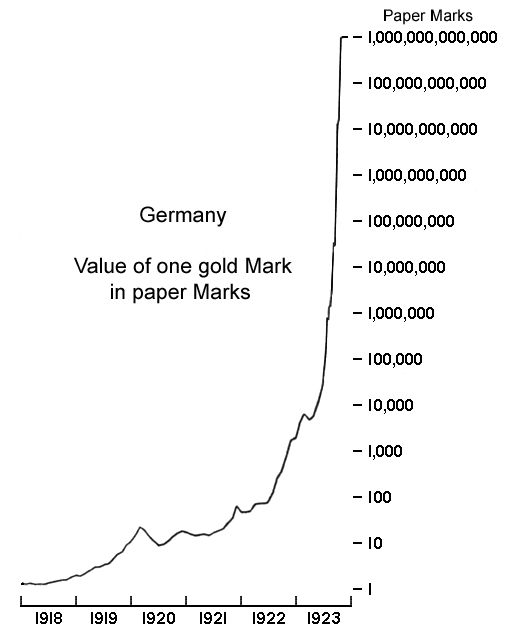
Stats

Images showing kids playing with the worthless banknotes
The more money was printed, the more value its decreased
The more money was printed, the more value its decreased
Weaknesses of the Weimar government
Constitution and proportional representation
It has three serious weaknesses which contributed towards its downfall
- Proportional representation
- People voted for a party rather than specific candidates
- Parties gained seats based on the number of votes won
- Democratic and fair system but resulted in a high degree of fragmentation in parliament
- Too many small, competing parties without any party gaining a majority
2. Coalition Government
- All the parties came together to form a coalition government
- A number of parties had extreme ideas and were not willing to compromise
- The coalition government kept breaking up, leading to frequent changes of government
- There were 20 different coalition governments form 1919-1933
- Difficult to pass laws, thus, seen as weak by the German People
3. Article 48 of Weimar Constitutuion
- Allowed the president to dissolved both houses of parliament and rule by the decree for six months in 'time of emergency'
- Civil liberties could be suspended
- What constituted as an emergency was not clearly defined
- Exploited by Hitler to seize power legally and to remain in power
As there was no single party in overall control parties had to join together to form a government. However, each party had different aims which made it difficult for the Reichstag to govern. Consequently, there were many changes of government which led to political instability. This was reflected in 376 political assassinations up to 1923.
Despite being from the democratic left, during the early 1920s, Friedrich Ebert relied heavily on the traditionally right-wing army and Freikorps in order to keep control of the country.
Conservative attitudes tended to overemphasise the threat from the left, whilst the threat from the right was severely under estimated

I can infer that the parties were undecide and was not balance

Great Depression
In the early 1930s, the mood in Germany was grim. The worldwide economic depression had hit the country especially hard, and millions of people were out of work. Still fresh in the minds of many was Germany's humiliating defeat fifteen years earlier during World War I, and Germans lacked confidence in their weak government, known as the Weimar Republic. These conditions provided the chance for the rise of a new leader, Adolf Hitler, and his party, the National Socialist German Workers' Party, or Nazi party for short.
Hitler was a powerful and spellbinding speaker who attracted a wide following of Germans desperate for change. He promised the disenchanted a better life and a new and glorious Germany. The Nazis appealed especially to the unemployed, young people, and members of the lower middle class (small store owners, office employees, craftsmen, and farmers).
The party's rise to power was rapid. Before the economic depression struck, the Nazis were practically unknown, winning only 3 percent of the vote to the Reichstag (German parliament) in elections in 1924. In the 1932 elections, the Nazis won 33 percent of the votes, more than any other party. In January 1933 Hitler was appointed chancellor, the head of the German government, and many Germans believed that they had found a savior for their nation
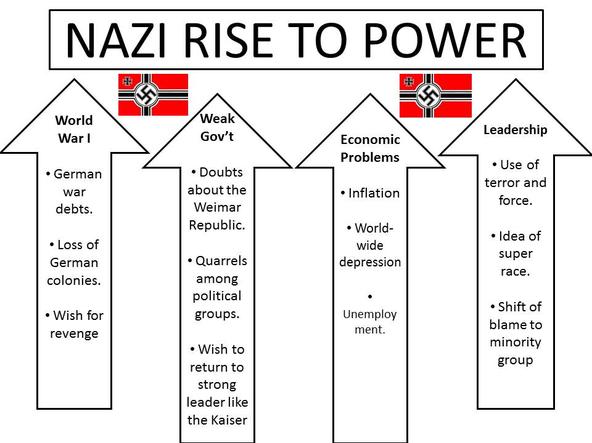
This picture shows how Nazi rise to power
The Weimar government failed to respond effectively to the crisis. Heinrich Bruning, who became chancellor in March 1930, feared inflation and budget deficits more than unemployment. Rather than spending to stimulate the economy and create jobs, Bruning opted to increase taxes (to reduce the budget deficit) then implemented wage cuts and spending reductions (to lower prices). Bruning’s policies were rejected by the Reichstag – but the chancellor had the support of President Hindenburg, who issued them as emergency decrees in mid-1930. Bruning’s measures failed, and probably increased German unemployment and public suffering rather than easing it. They also contributed to further government instability and bickering between Reichstag parties.
The real beneficiary of the Depression and Bruning’s disastrous policy response was Adolf Hitler. With public discontent soaring, membership of Hitler’s party increased to record levels. The Nazi leader found the situation to his liking: “Never in my life have I been so well disposed and inwardly contented as in these days. For hard reality has opened the eyes of millions of Germans.” Eleven months after the Wall Street Crash, the NSDAP was able to increase its share of the Reichstagvote almost ninefold. In the July 1932 elections the Nazis won 230 seats – by far the highest number held by one party in the Reichstag at any point during the Weimar period

The Great Depression strikes down


Europe decided that democracy wasn't its thing after all, and looked for nice trustworthy generals to take over the hopelessly ineffective parliamentary governments -- like in Germany. But the President of Germany, General Paul von Hindenburg, was elderly and out of his depth, and after a while was forced to ask that nice Herr Hitler to organize a new government. Hitler's National Socialist Workers Party had never gotten a majority, but the time was ripe, and the Nazis never cared much for rules. So they took power.